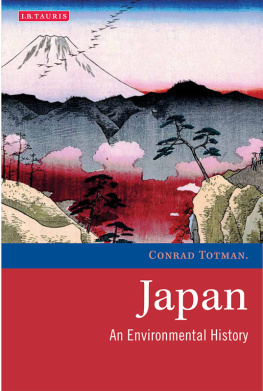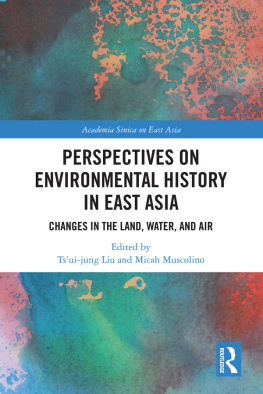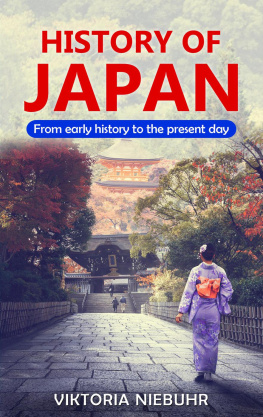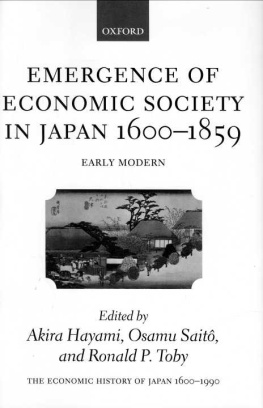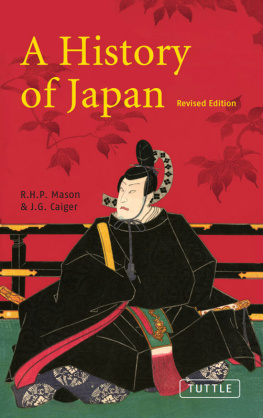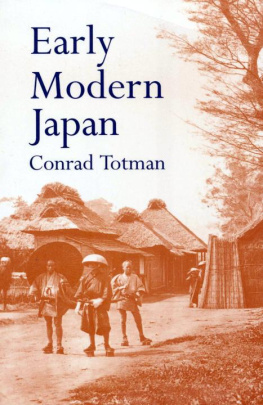Conrad Totman is Professor Emeritus in Japanese History, Yale University. Acknowledged as the leading Western authority on Japanese environmental history, his books include Japan before Perry, The Green Archipelago, Early Modern Japan and A History of Japan (3rd edn., 2010).
ENVIRONMENTAL HISTORY AND GLOBAL CHANGE SERIES
Series Editor
Emeritus Professor Ian Whyte, University of Lancaster
Editorial Board
Kevin Edwards, University of Aberdeen
Eric Pawson, University of Canterbury, New Zealand
Christian Pfister, University of Berne
I. Simmons, University of Durham
T.C. Smout, University of St Andrews
Harriet Ritvo, Massachusetts Institute of Technology
This important new series provides a much needed forum for understanding just how and why our environment changes. It shows how environmental history with its unique blend of geography, history, archaeology, landscape, environment and science is helping to make informed decisions on pressing environmental concerns and providing crucial insights into the mechanisms that influence environmental change today. The focus of the series will be on contemporary problems but will also include work that addresses major techniques, key periods and important regions. At a time when the scale and importance of environmental change has led to a widespread feeling that we have entered a period of crisis, the Environmental History and Global Change Series provides a timely, informed and important contribution to a key global issue.
Documentary Records of Climate Change, Astrid Ogilvie
A Dictionary of Environmental History, Ian Whyte
The Mediterranean World: An Environmental History, Neil Roberts
Seeds of Empire: The Environmental Transformation of New Zealand, Tom Brooking and Eric Pawson
Cities: An Environmental History, Ian Douglas
Japan: An Environmental History, Conrad Totman
Crimea and the Black Sea: An Environmental History, Carlos Cordova

New paperback edition published in 2016 by
I.B.Tauris & Co. Ltd
London New York
www.ibtauris.com
First published in hardback in 2014 by I.B.Tauris & Co. Ltd
Copyright 2014, 2016 Conrad Totman
The right of Conrad Totman to be identified as the author of this work has been asserted by the author in accordance with the Copyright, Designs and Patents Act 1988.
All rights reserved. Except for brief quotations in a review, this book, or any part thereof, may not be reproduced, stored in or introduced into a retrieval system, or transmitted, in any form or by any means, electronic, mechanical, photocopying, recording or otherwise, without the prior written permission of the publisher.
Every attempt has been made to gain permission for the use of the images in this book. Any omissions will be rectified in future editions.
References to websites were correct at the time of writing.
ISBN:978 1 78453 743 2
eISBN:978 1 78672 152 5
ePDF:978 1 78673 152 4
A full CIP record for this book is available from the British Library
A full CIP record is available from the Library of Congress
Library of Congress Catalog Card Number: available
Typeset by 4word Ltd, Bristol
Contents
Illustrations
Acknowledgements
I thank the Yale University Library for having maintained the splendid book collection that enabled me to prepare this text. And I thank I.B.Tauris and its consultants for giving me an opportunity to write it. Finally, I thank my family and my fellow residents of Whitney Center for bearing with my absent-mindedness during the three years of the books preparation.
Notes on Japanese Terminology
The names of Japanese individuals are given in the customary Japanese manner, surname first.
The Japanese language employs both long vowels and short vowels for the sounds represented by the Roman letters o and u. The long vowels are formally denoted by a long mark over the letter: and . Following customary practice, however, this text omits the long marks for common geographical terms or terms that have been anglicized. Thus Kysh appears here as Kyushu.
Long marks have been omitted in the following terms: Hokkaid, saka, Kyto, Ryky Islands, Kysh and Tky.
Glossary of Japanese Terms
Ainu | the forager people of northeast Japan, ca. 1600ff |
akamatsu | Japanese red pine (Pinus densiflora) |
akut | evil group, outlaw bands of ca. 12501350 CE |
amado | heavy, sliding, wooden exterior-wall panels |
baito | secondary capitals (of ritsury era) |
baiu | summer monsoon weather |
bakufu | camp government, denoting shogunal regimes, ca. 11801868 |
bakuhan | an elision of bakufu and han; denoting the shogun-daimy ruling system of 16031868 |
bunbu | the civil and military arts, the type of knowledge that rulers urged warriors to pursue, ca. 16001850 |
bunmei kaika | civilization and enlightenment, a slogan invoked by reformers after 1870 |
chisan chisui | management of mountains and waters, the Confucian term for protection forestry |
ch | a measure of land (2.45 acres; 0.992 hectares) |
daimy | great names, regional barons of ca. 14001870 |
daizu | soybeans; an Asiatic legume (Glycine soya) |
dekasegi | working away from home on a seasonal or temporary basis |
egoma | an Asiatic mint (Perilla ocimoides) |
Emishi | early name for the forager people of northeastern Japan |
Ezo | a later name for the forager people from Thoku northward (and a term for that largely unknown region) |
ezomatsu | Ezo spruce (Picea jezoensis Carr.) |
fukoku kyhei | rich country; strong army, a classic Chinese phrase invoked by Japans leaders after 1870 |
fusuma | lightweight, opaque, sliding-door panels |
gekokuj | those below overthrowing those above, local warriors toppling their superiors in power struggles |
genya | barren or waste land; a moor |
gunken | district/prefecture, a term denoting a centralized, hierarchical political order |
hageyama | bald or denuded mountains |
hajiki | a type of earthenware |
han | a baronial (daimy) domain, ca. 15501870 |
hayashi | forest or woodland |
Hayato | a forager people of Kyushu |
heimin | commoner, a class label for non-titled people after 1870 |
hinoki | Japanese cypress (Chamaecyparis obtusa) |
hiratake | a mushroom (Agaricus subfunereus) |
hken | an enfeoffment or feudal system of hereditary rule by a suzerain and subordinates |
Next page
